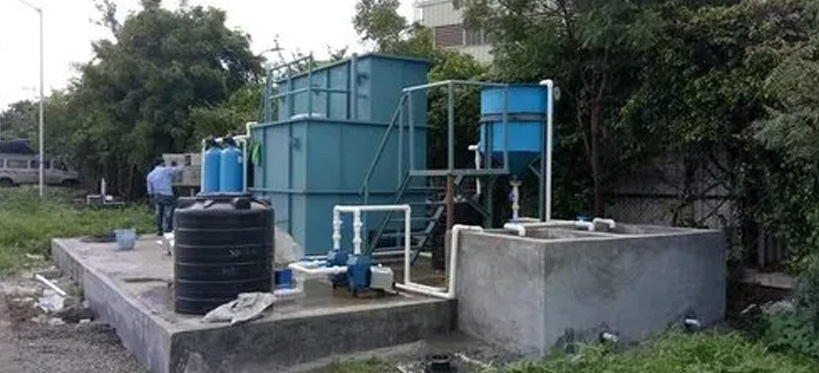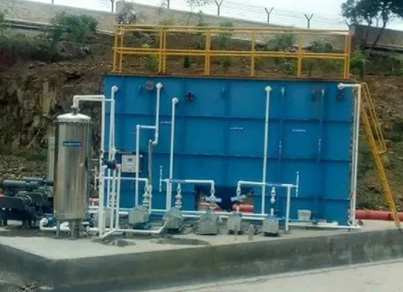
Effluent Treatment Plant (ETP)
An Effluent Treatment Plant (ETP) is a facility engineered to purify industrial wastewater before it's released into the environment. ETPs employ diverse processes, including physical, chemical, and biological treatments, to eliminate contaminants and pollutants. These facilities are not just essential for maintaining environmental integrity, safeguarding water bodies, and upholding public health standards, but they also significantly contribute to reducing ecological degradation and ensuring compliance with regulatory requirements.
By treating wastewater, ETPs mitigate the adverse impacts of industrial activities, playing a pivotal role in sustainable development by promoting responsible wastewater management practices, fostering resource conservation, and facilitating the safe reuse of treated water for various purposes.
Why chose Agile Venture?
Choose Agile Venture for ETP Plant ETP manufacturing and services, and you'll benefit from their exceptional expertise, cutting-edge solutions. Agile Venture delivers tailored solutions to meet unique client requirements.
- Cutting-Edge Solutions
- Cost Effective
- Tailored Solutions
- Quality of Services

Innovative Solution
Innovative solution transforms wastewater treatment, enhancing efficiency and sustainability.
100% Quality
Guaranteed excellence, ensuring complete satisfaction with every project undertaken.
24/7 Support
Dedicated support ensures seamless operations, maximizing client satisfaction and success.
ETP Plant
ETP Plant is a facility engineered to purify industrial wastewater before it's released.
Working Process of ETP Plant
The Effluent Treatment Plant (ETP) process is a multi-stage purification system for wastewater from industrial sources. It begins with physical treatment, including screening to remove large objects and sedimentation to settle suspended solids.
Chemical treatments are then applied to neutralize pH levels and precipitate dissolved metals. Biological treatment follows, where aerobic or anaerobic microorganisms degrade organic contaminants. The final stage, tertiary treatment, involves advanced processes like filtration or disinfection to remove remaining pollutants further.
The result is water that meets regulatory standards and can be safely discharged into the environment or reused. The sludge generated also undergoes further treatment or disposal, ensuring a comprehensive and sustainable approach to wastewater management.
How we help in ETP Plant requirement
At Agile Venture, we provide comprehensive Effluent Treatment Plant (ETP) services by meticulously assessing your unique requirements. Our process begins with a detailed analysis of your wastewater characteristics, regulatory standards, and operational needs.
We then recommend suitable technology, considering efficiency, cost-effectiveness, and environmental impact. Capacity requirements are determined based on anticipated wastewater volumes and treatment goals. We prioritize your collaboration throughout the process, offering tailored solutions and expert guidance.
Our commitment to excellence ensures that the selected ETP design aligns perfectly with your objectives, delivering efficient wastewater treatment solutions that meet regulatory and operational demands, making you feel valued and involved in the decision-making process.
Different types of Effluent Treatment Plant (ETP) technologies include:
- 1. Activated Sludge Process: Utilizes microbial activity in aerated tanks to degrade organic pollutants.
- 2. Extended Aeration Process: Similar to activated sludge but with longer aeration times, it is suitable for low-to-medium strength wastewaters.
- 3. Membrane Bioreactor (MBR): Combines biological treatment with membrane filtration for high-quality effluent production.
- 3. Sequential Batch Reactor (SBR): Operates in batch mode, allowing for sequential treatment stages within a single reactor.
- 4. Moving Bed Biofilm Reactor (MBBR): This reactor utilizes floating plastic media to support biofilm growth, enhancing biological treatment efficiency.
Frequently Asked Questions (FAQ)
What is the expected lifespan of the Effluent Treatment Plant (ETP) equipment?
Effluent Treatment Plant (ETP) equipment generally has an expected lifespan of 10 to 20 years. However, this duration can vary based on factors such as maintenance practices, quality of materials, and operational conditions. For instance, regular cleaning of filters, timely replacement of worn-out parts, and periodic checks for leaks can significantly extend the equipment's lifespan.
How much space is required to install the ETP system?
The space required to install an Effluent Treatment Plant (ETP) system varies depending on plant capacity, which can range from [10,000 to 100,000] liters per day for small-to-medium-scale installations, treatment processes, and local regulations. Typically, ETPs are custom-designed to fit available space, ranging from a few hundred to several thousand square meters for small—to medium-scale installations and potentially more for larger industries.
What are the maintenance requirements for the ETP facility?
Effluent Treatment Plants (ETPs) can be customized to treat specific industrial effluents, such as those containing heavy metals, organic compounds, or high levels of acidity. This customization involves selecting appropriate treatment processes, technologies, and equipment tailored to the characteristics and contaminants present in the effluent, ensuring effective and efficient removal of pollutants according to regulatory requirements and industry standards.
Can the ETP be customized to treat specific types of industrial effluents?
The operational costs associated with running an Effluent Treatment Plant (ETP) include expenses for electricity to power pumps and equipment, which can account for [30-50%] of the total cost, chemicals for treatment processes, labor for operation and maintenance, disposal of sludge or treated effluent, and periodic servicing and repairs to ensure smooth and efficient operation.
What are the operational costs associated with running the ETP?
The duration of installing and commissioning an Effluent Treatment Plant (ETP) varies based on factors like plant size, complexity, site readiness, and regulatory approvals. Typically, installation can take several weeks to months, followed by commissioning, which may require additional testing, calibration, and fine-tuning before full operation.
How long does it take to install and commission the ETP?
The duration to install and commission an Effluent Treatment Plant (ETP) varies based on factors like plant size, complexity, site readiness, and regulatory approvals. Typically, installation can take several weeks to months, followed by commissioning, which may require additional time for testing, calibration, and fine-tuning before full operation.
Is training provided for our staff on operating the ETP system?
Yes, training is typically provided for staff on operating the Effluent Treatment Plant (ETP) system. This training covers aspects such as plant operation, equipment handling, safety protocols, troubleshooting procedures, and regulatory compliance. Properly trained staff ensures smooth and efficient operation of the ETP, maximizing its effectiveness in treating wastewater.
What kind of regulatory approvals are needed to install and operate the ETP?
Regulatory approvals required for installing and operating an Effluent Treatment Plant (ETP) vary depending on local laws and environmental regulations. Typically, permits are needed for construction, discharge of treated effluent, air emissions, hazardous waste management, and compliance with water quality standards. Non-compliance with these regulations can result in fines, legal action, or even shutdown of the ETP. Ensuring compliance with these regulations is therefore essential for ETP operation.
Can the ETP handle fluctuations in wastewater flow and quality?
Effluent Treatment Plants (ETPs) are designed with a high degree of adaptability, capable of handling fluctuations in wastewater flow and quality through various mechanisms such as adjustable treatment processes, buffer tanks, and automated controls. This ensures that the ETP maintains consistent performance and effectively treats wastewater despite variations in flow rates and contaminant levels, providing a flexible solution for your industrial needs.
Are there any additional services or support provided after installing the ETP?
After installing an Effluent Treatment Plant (ETP), you can rest assured that comprehensive support and services are in place. These include ongoing maintenance contracts, technical support for troubleshooting and optimization, staff training, regular inspections, and upgrades to accommodate changing regulations or operational needs. This ensures long-term efficiency and compliance, providing you with peace of mind.
Get in Touch
Connect with us today for tailored solutions, exceptional service, and transformative results for your wastewater needs.
Call us on
+91-8882354793
Email us
contact@agileventures.in
